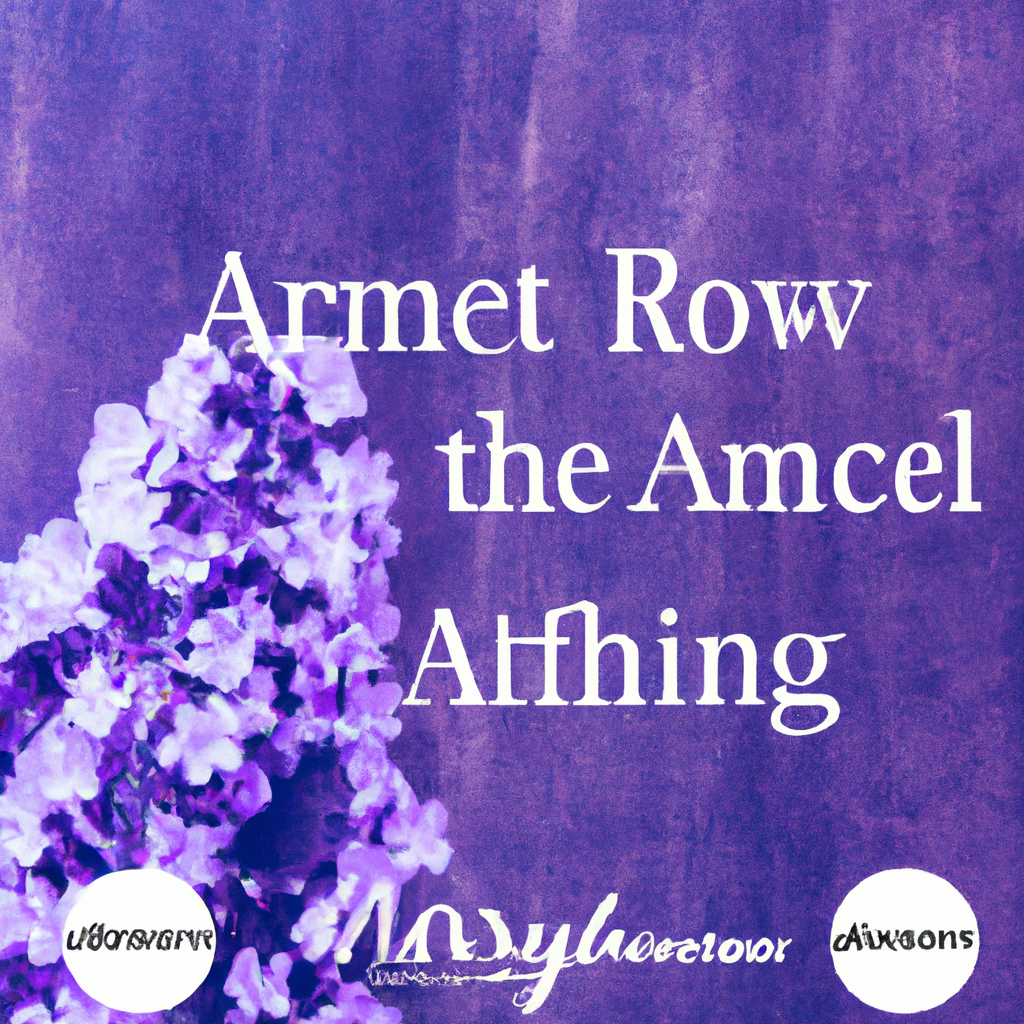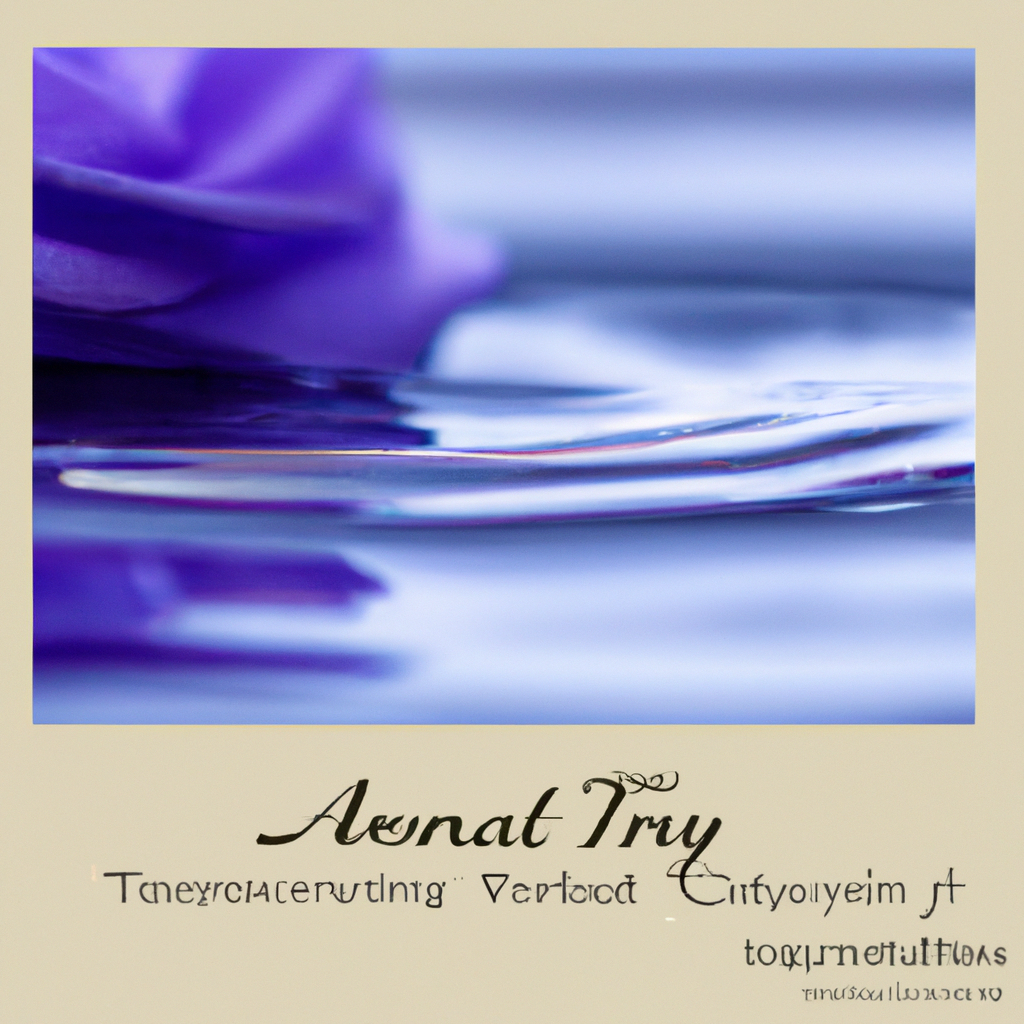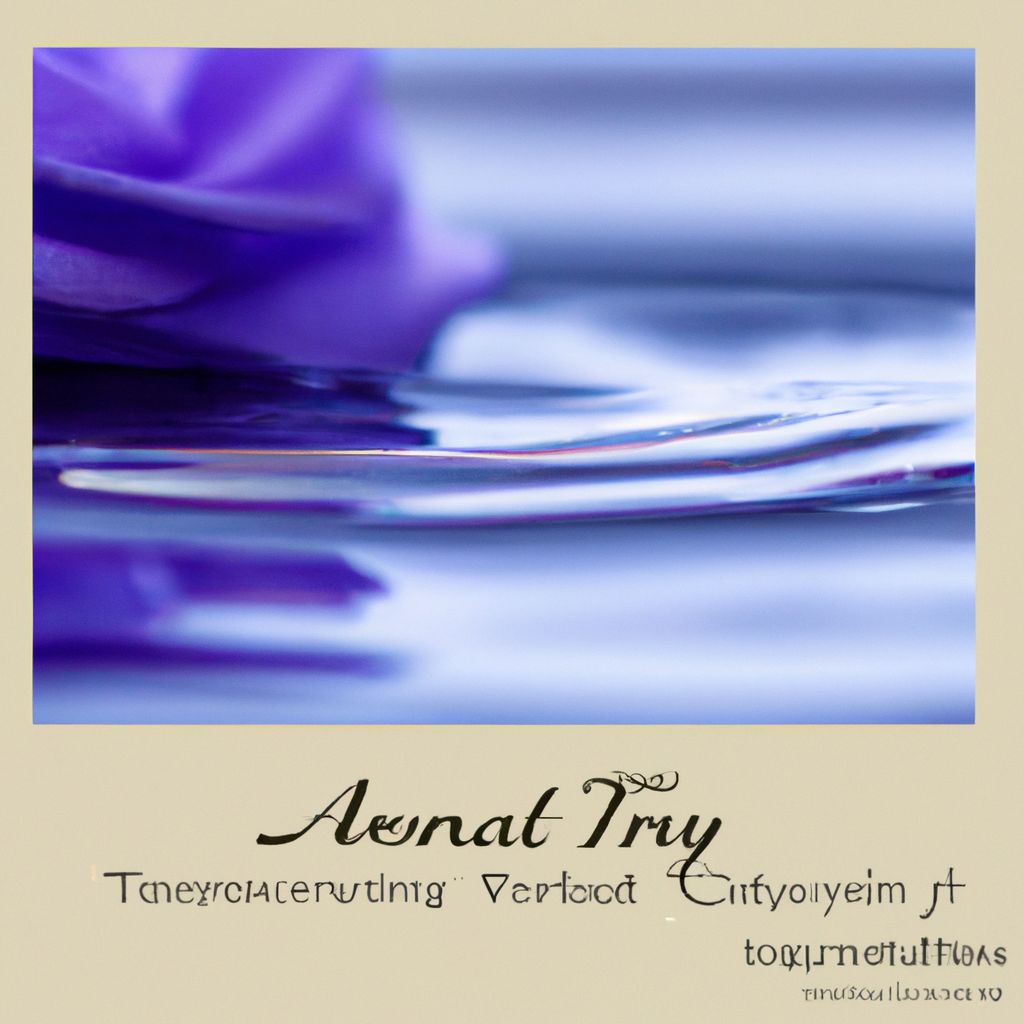Imagine stepping into a tranquil oasis, surrounded by the soothing scent of lavender and the gentle sound of calming music. As your mind and body start to relax, skilled hands begin to work their magic, gently kneading away tension and stress. This is the world of aromatherapy massage, a holistic approach that combines the power of touch with the therapeutic properties of essential oils. From relieving muscle aches to promoting better sleep, aromatherapy massage offers a wide range of benefits for both your physical and mental well-being. In this article, we will unlock the healing power of aromatherapy massage and explore the myriad of ways it can enhance your overall health.

Understanding Aromatherapy Massage
Aromatherapy massage is a form of massage therapy that incorporates the use of essential oils to provide a therapeutic and relaxing experience. This holistic approach combines the benefits of massage with the therapeutic properties of essential oils. By inhaling the aroma or absorbing the oils through the skin, you can experience a range of physical, mental, and emotional benefits.
Definition of Aromatherapy Massage
Aromatherapy massage is a gentle, soothing massage that involves the application of diluted essential oils to the skin. These essential oils are carefully selected based on their specific properties and therapeutic benefits. The massage techniques used in aromatherapy massage are designed to relax the muscles, improve circulation, and promote overall well-being.
How it Differs from Traditional Massage
While aromatherapy massage shares some similarities with traditional massage techniques, the addition of essential oils sets it apart. In traditional massage, the focus is primarily on manipulating the muscles and soft tissues of the body. Aromatherapy massage combines these techniques with the use of essential oils to enhance the therapeutic effects. The oils not only provide a pleasant scent but also offer additional healing properties.
History and Origins of Aromatherapy Massage
Aromatherapy massage has been used for centuries in various cultures around the world. The ancient Egyptians were known to incorporate fragrances into their massage rituals, while the Greeks and Romans used aromatic oils for both physical and spiritual well-being. The practice of aromatherapy massage as we know it today originated in the early 20th century when French chemist René-Maurice Gattefossé coined the term “aromatherapy” and studied the therapeutic effects of essential oils.
Essential Oils in Aromatherapy Massage
Introduction to Essential Oils
Essential oils are highly concentrated plant extracts that capture the natural fragrance and therapeutic properties of plants. These oils are derived through various methods, such as steam distillation or cold-pressing, and contain the essence of the plant from which they are extracted. Each essential oil has its own unique composition, aroma, and therapeutic properties.
Common Essential Oils Used in Aromatherapy Massage
There is a wide range of essential oils used in aromatherapy massage, each with its own specific benefits. Some commonly used essential oils include lavender, chamomile, eucalyptus, peppermint, and rosemary. Lavender oil, for example, is known for its calming and relaxing properties, while eucalyptus oil has a soothing effect on respiratory conditions.
Choosing the Right Essential Oils for Different Health Concerns
When choosing essential oils for aromatherapy massage, it is essential to consider your specific health concerns. If you are seeking relief from stress and anxiety, oils like lavender, bergamot, or chamomile may be beneficial. For physical pain or inflammation, oils such as peppermint, ginger, or helichrysum can provide relief. It is crucial to consult with a qualified aromatherapist or massage therapist to ensure you select the most appropriate oils for your needs.

Techniques and Application of Aromatherapy Massage
Various Massage Techniques in Aromatherapy
In aromatherapy massage, various massage techniques are employed to promote relaxation and aid in the absorption of essential oils. These techniques may include effleurage (long, gliding strokes), petrissage (kneading and rolling motions), and friction (deep, circular motions). The therapist will tailor the massage to address specific areas of tension or target certain health concerns.
Methods of Applying Essential Oils During Massage
There are several methods of applying essential oils during aromatherapy massage. The most common approach is to dilute the essential oils in a carrier oil, such as sweet almond or jojoba oil, before applying them to the skin. The therapist may also use a diffuser to disperse the aromas throughout the treatment room, allowing you to inhale the oils while receiving the massage.
Precautions and Safety Measures in Aromatherapy Massage
While aromatherapy massage is generally safe, it is essential to take certain precautions and follow safety guidelines. It is crucial to inform your therapist about any allergies or sensitivities you may have before the massage. Some essential oils may cause skin irritation or allergic reactions in certain individuals. Additionally, pregnant women, individuals with certain medical conditions, or those taking specific medications should consult with a healthcare professional before receiving aromatherapy massage.
Health Benefits of Aromatherapy Massage
Aromatherapy massage offers a myriad of health benefits, both physical and mental. Here are some of the key advantages you can experience through this therapeutic practice.
Physical Health Benefits
Aromatherapy massage can have a positive impact on various physical health concerns. The gentle massage techniques help relax the muscles and improve blood circulation, which can alleviate pain and promote healing. Essential oils with analgesic properties, such as peppermint or lavender, can provide natural pain relief. The combination of massage and essential oils can also support the immune system, boost energy levels, and improve overall physical well-being.
Mental and Emotional Health Benefits
In addition to its physical benefits, aromatherapy massage has significant effects on mental and emotional well-being. The scents of essential oils can have a profound impact on emotions and mood. Certain oils, such as bergamot or ylang-ylang, have uplifting and mood-enhancing properties. Aromatherapy massage can help reduce anxiety, stress, and symptoms of depression, providing a sense of calm and balance.
Stress Relief and Relaxation
One of the primary benefits of aromatherapy massage is its ability to reduce stress and induce relaxation. The combination of the soothing massage techniques and the scent of the essential oils helps calm the nervous system, lower heart rate, and promote deep relaxation. Regular aromatherapy massage sessions can be an effective tool in managing stress and improving overall well-being.
Improvement in Sleep Quality
For those struggling with insomnia or sleep disturbances, aromatherapy massage can be highly beneficial. Essential oils like lavender or chamomile have sedative properties that can promote a sense of tranquility and aid in falling asleep faster. The relaxation induced by the massage itself, combined with the calming aroma of the oils, can contribute to a more restful and rejuvenating sleep.
Pain Relief and Inflammation Reduction
Effects of Aromatherapy Massage on Pain
Aromatherapy massage has been shown to be effective in reducing pain and discomfort. The combination of massage techniques and the analgesic properties of certain essential oils can target specific areas of pain, such as sore muscles or inflamed joints. Massage helps increase blood flow to affected areas, promoting healing and relieving pain.
Alleviating Headaches and Migraines
For individuals suffering from chronic headaches or migraines, aromatherapy massage can provide relief. Essential oils like peppermint, lavender, or eucalyptus have been found to have a positive effect on reducing the frequency and intensity of headaches. The massage techniques used during the treatment can also help relieve tension in the head and neck, further alleviating headache symptoms.
Benefits for Chronic Pain Conditions
Aromatherapy massage can offer significant benefits for individuals with chronic pain conditions, such as fibromyalgia or arthritis. The gentle massage techniques help relax tight muscles, improve flexibility, and reduce inflammation. Additionally, certain essential oils, such as ginger or helichrysum, have anti-inflammatory properties that can help manage pain associated with these conditions.
Anti-inflammatory Properties of Essential Oils in Aromatherapy
Many essential oils used in aromatherapy massage possess anti-inflammatory properties. Oils such as frankincense, turmeric, or chamomile can help reduce inflammation in the body, providing relief from conditions like arthritis or inflammatory skin conditions. By reducing inflammation, these oils can also support overall health and well-being.
Boosting the Immune System
Stimulating Lymphatic System with Aromatherapy Massage
Aromatherapy massage can stimulate the lymphatic system, which plays a vital role in the body’s immune response. The gentle strokes and motions of the massage help move lymph fluid throughout the body, aiding in the elimination of toxins and waste products. Essential oils like tea tree, lemon, or eucalyptus can further enhance the lymphatic function and support the immune system.
Enhancing Blood Circulation
Good blood circulation is essential for overall health and well-being. Aromatherapy massage improves blood flow to various parts of the body, ensuring that oxygen and nutrients reach the cells more effectively. Improved circulation can enhance the body’s natural defense mechanisms and promote optimal health.
Supporting the Body’s Natural Defense Mechanisms
Aromatherapy massage can support the body’s natural defense mechanisms by strengthening the immune system. Many essential oils used in aromatherapy, such as lavender, tea tree, or eucalyptus, have antimicrobial, antiviral, and antifungal properties. Inhaling these oils or applying them topically during a massage can help protect against pathogens and boost the body’s ability to fight off infections.
Improving Skin Health
Anti-aging Effects of Aromatherapy Massage
Aromatherapy massage can have anti-aging effects on the skin. Certain essential oils, such as rosehip or geranium, are known for their ability to promote cell regeneration and improve skin elasticity. The massage techniques stimulate blood flow to the skin, allowing the essential oils to penetrate deeply and nourish the skin from within. Regular aromatherapy massage can help reduce the appearance of fine lines, wrinkles, and age spots, leaving your skin looking revitalized and youthful.
Nourishing and Moisturizing the Skin
Dry or dehydrated skin can greatly benefit from aromatherapy massage. Essential oils like jojoba, almond, or coconut oil, which are commonly used as carrier oils, provide deep hydration and nourishment to the skin. The massage techniques help these oils penetrate the skin layers, leaving it feeling soft, supple, and well-moisturized.
Reducing Skin Conditions like Acne and Eczema
Aromatherapy massage can also help alleviate common skin conditions like acne and eczema. Essential oils with antibacterial and anti-inflammatory properties, such as tea tree or lavender, can help reduce inflammation and kill off acne-causing bacteria. The massage techniques and the soothing qualities of these oils can also provide relief from itchiness and inflammation associated with eczema.
Mental and Emotional Well-being
Effects on Anxiety and Depression
Aromatherapy massage has been shown to have a positive impact on individuals experiencing anxiety or depression. The calming scents of essential oils, combined with the relaxing massage techniques, can help reduce feelings of anxiety and promote a sense of tranquility. Oils known for their mood-enhancing properties, such as bergamot, clary sage, or ylang-ylang, help uplift the mood and alleviate symptoms of depression.
Promoting Positive Mood
In addition to anxiety and depression, aromatherapy massage can enhance overall mood and well-being. The release of endorphins during the massage, combined with the uplifting scents of essential oils, promotes a positive emotional state. Aromatherapy massage can be a powerful tool to uplift your spirits, reduce stress, and enhance overall happiness.
Relieving Mental Fatigue and Enhancing Focus
For individuals experiencing mental fatigue or struggling with concentration, aromatherapy massage can offer relief. Certain essential oils, such as peppermint or rosemary, have stimulating properties that can help clear the mind and improve focus. The massage techniques used during the treatment can also help relax tense muscles, reduce headaches, and enhance mental clarity.
Balancing Hormones and Managing Menstrual Symptoms
Regulating Hormonal Imbalances
Aromatherapy massage can help balance hormonal imbalances in the body. Certain essential oils, like clary sage or geranium, have hormone-balancing properties that can help regulate menstruation and ease symptoms associated with hormonal fluctuations. Regular aromatherapy massage sessions can support overall hormonal health and well-being.
Alleviating Menstrual Cramps and PMS
Many women experience discomfort and pain during their menstrual cycle. Aromatherapy massage can offer relief from menstrual cramps and PMS symptoms. Essential oils like lavender, clary sage, or chamomile can help reduce pain and inflammation, soothe muscles, and provide a sense of relaxation during this time.
Benefits for Menopausal Symptoms
Aromatherapy massage can also be beneficial for women going through menopause. Essential oils like geranium, cypress, or peppermint can help manage hot flashes, mood swings, and other symptoms associated with menopause. The massage techniques used during the treatment can provide comfort and relaxation, helping women navigate this transitional phase with ease.
Aromatherapy Massage for Relaxation and Self-Care
Creating a Relaxing Environment
Aromatherapy massage is often performed in a calming and inviting environment to enhance the relaxation experience. Soft lighting, soothing music, and the subtle aroma of essential oils create a tranquil atmosphere. The therapist will ensure that the treatment room is warm, comfortable, and free from distractions to promote deep relaxation.
Benefits in Self-Care and Stress Management
Aromatherapy massage is a powerful self-care tool that can help reduce stress and promote overall well-being. By taking the time to pamper yourself and indulge in a massage, you are prioritizing your mental and physical health. Aromatherapy massage allows you to disconnect from the outside world, unwind, and recharge.
Combining Aromatherapy Massage with Other Relaxation Techniques
Aromatherapy massage can be combined with other relaxation techniques to enhance the experience further. Deep breathing exercises, meditation, or yoga before or after the massage can help maximize the benefits and deepen the sense of relaxation. Additionally, incorporating mindfulness practices into your daily routine can prolong the effects of the massage, allowing you to maintain a state of calm and well-being.
In conclusion, aromatherapy massage offers a wide range of physical, mental, and emotional benefits. From pain relief and inflammation reduction to stress relief, improved sleep quality, immune system support, and skin health improvement, the therapeutic power of essential oils combined with massage techniques is undeniable. Aromatherapy massage not only provides relaxation and self-care but also serves as a holistic approach to achieving optimal well-being from within. So go ahead, indulge in the healing power of aromatherapy massage and experience the profound effects it can have on your overall health and well-being.
